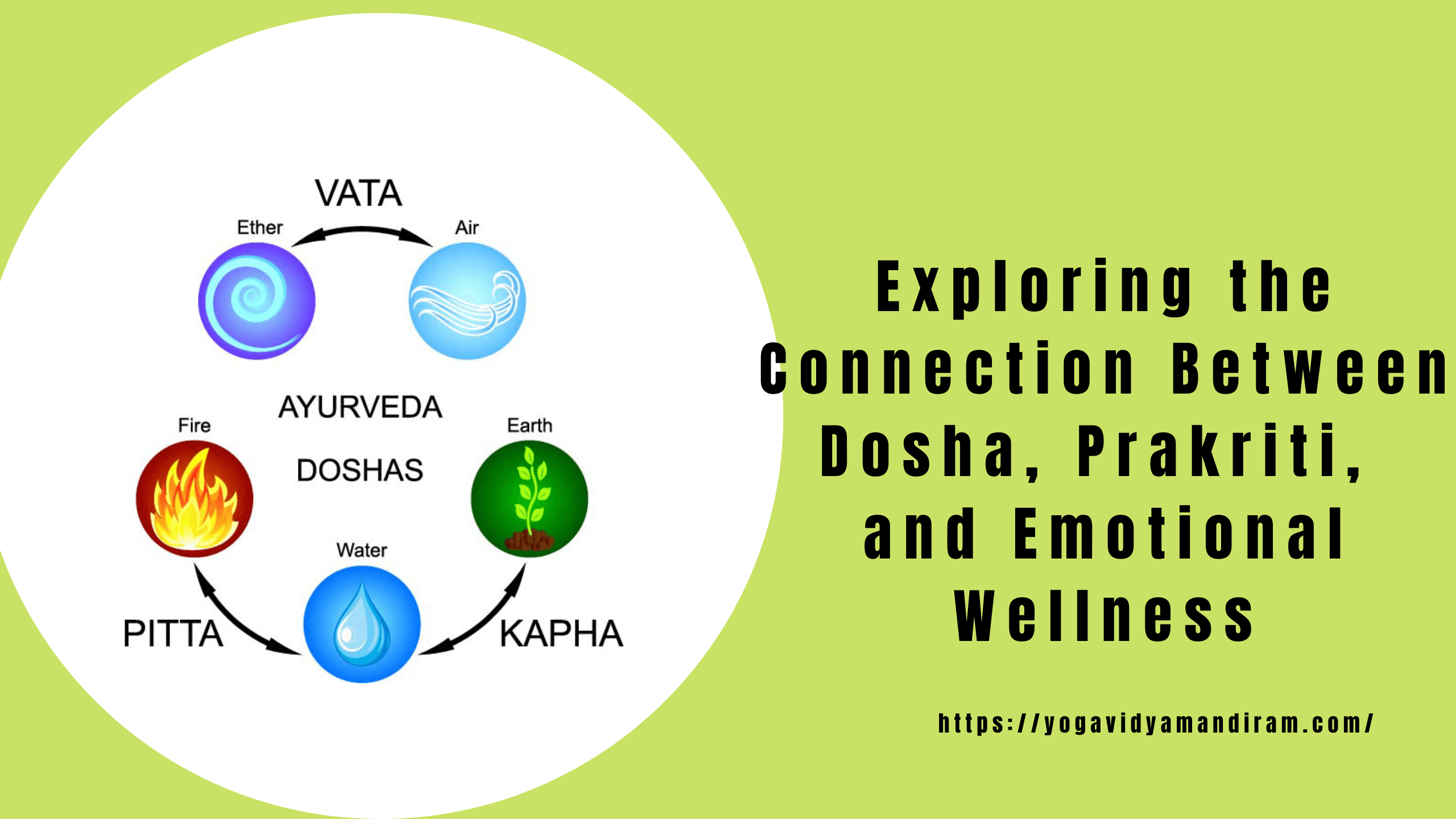The balance has become more important than ever in a world where stress and anxiety are usually the order of the day. Have you ever been baffled by the fact that there are days when you feel it is an uphill battle and then there are days when you feel joyful with little effort? The ancient wisdom of Ayurveda provides a very profound knowledge of our emotional landscapes in the terms of Dosha and Prakriti. Think of these as distinct strands, which are part of your fabric–they not only affect your physical health, but also your mental and emotional health. Take an informative walk with us as we find out how knowing your personal constitution will help you develop strength, peace, and more about yourself in all areas of life. You need to make sense of the world around you or just want to improve your overall wellbeing, this journey will yield useful insights that have never been offered to you before!
Introduction to Dosha and Prakriti: Explaining the Concept of Mind-Body Types in Ayurveda
Have you ever asked yourself why there are people who appear to sail through life and there are those who find it difficult to keep their emotions at par? Perhaps, this could be the ancient wisdom of Ayurveda, which is the system of holistic approach and focuses on the unity of mind and body. The core of this philosophy is comprised of two important notions, Dosha and Prakriti. These words are used to define our distinctive mind-body types, which do not only influence the physical forms of our bodies, but they also determine the way we feel.
Knowing about your Dosha may open the door to your psychological health. Think about your own personal map of coping with stress, anxiety and even happiness! Pitta or Vata each type has its advantages and disadvantagees, whether you are a hot blooded Pitta or an airy Vata. Exploring these relations enables you to make wise actions toward a better emotional well-being.
Take this ride with us as we explore deeper what makes you uniquely you- through the prism of the Ayurveda tradition. And how, knowing your Dosha can be the key to the balance state of mind!
Join The Course: 200 Hour Yoga TTC in Rishikesh
Understanding the Three Doshas: Vata, Pitta, and Kapha
Ayurveda recognizes three main doshas: Vata, Pitta and Kapha. Each of them reflects specific traits that have an impact on our physical and emotional conditions.
Vata is the air element. It controls motion and creativity and may be the cause of anxiety in its imbalance. Individuals of pure Vata are usually fast thinkers but lack of consistency.
Pitta is linked with heat and change. This is the dosha that pushes ambition, concentration and passion. Nevertheless, when Pitta is too much, it may lead to irritability or aggression. People who are well equipped with this virtue are prone to becoming natural leaders.
Kapha is a mixture of the earth and water, which symbolize stability and sustenance. The individuals who have a strong Kapha are also nurturing, but may be out of balance, which results in their inability to overcome lethargy. They offer relationship grounding power.
Due to the realization of these doshas, we are able to know more about our inclinations, which also provide us with avenues of enhancing the overall well-being of ourselves by focusing on mindful practices which are unique to each specific type.
Identifying Your Prakriti: How to Determine Your Dominant Dosha
When you find out your Prakriti, it is an interesting self-discovery process. Not only the physical characteristics of a person are influenced by your predominating Dosha, but also the emotional nature and responses.
Start by observing yourself. Consider how you react to stress, or routine. Are you nervous and unsettled, more Vata like? Or are you inclined to get hot and to irritability, implying Pitta influence? You are maybe as much at peace, stable, and down-to-earth as Kapha.
There can also be an online quiz which can give some insights. Children You can find questionnaires that are easy to fill in to identify your main Dosha depending on personality and other lifestyle factors.
Physical characteristics are also involved. Both Doshas have their characteristics: Vata people tend to have dry skin, Pittas may turn out to be hot-blooded, Kaphas can be very strong built.
By taking these observations together, you will get closer to the understanding of the balance of energies in you. Such understanding acts as a source of health and emotional lucidity.
The Link Between Dosha and Emotional Wellness: How Your Mind-Body Type Affects Your Mental Health
The relationship between dosha and emotional wellness is deep. Both types of mind-bodies do not only affect the physical conditions but also the mental ones.
Vata people are frequently inventive and lively and may become anxious when they lack balance. Their thoughts are swirling with things that can even to cause excessive stress.
The pitta types can be aggressive but at the same time they can be irritable when overwhelmed with emotions. They are passionate about life but this passion becomes frustration in demanding times.
Kapha natures are easy going and nurturing but can experience lethargy. Underbalanced, the mood may be sad or complacent, which affects their general mood.
Knowing your dosha can assist in determining triggers that influence the emotional well-being. By recognizing these patterns, you are able to develop plans that will lead to mental clarity and stability that are specific to your unique constitution.
Balancing Your Dosha for Optimal Emotional Wellbeing: Tips and Techniques
A state of balance in your dosha is key to being emotionally well. The doshas have distinct traits that shape our way of thinking and feeling.
Grounding practices may be useful in Vata types. Think about adding a routine such as yoga or meditation to calm your mind. Warmth foods and relaxing herbal teas are used to cool the nervous energy that is usually linked to this dosha.
Pitta people flourish on cooling methods. Do something like swimming or have some refreshing fruits and vegetables to counteract intense emotions. Meditations may also help them to control their urge and ambition.
Kapha type can be helped by stimulating activities that stimulate motivation. Exercises, particularly aerobic exercises, make the body more energetic and get the mood elevated. Add spices such as ginger or cayenne to the food to promote absorption and energy.
The most important thing when balancing your dosha in order to be emotionally healthy is listening to your own body. Customize these recommendations according to what you can connect with most anytime.
Embracing Individuality: Why One Size Does Not Fit All in Ayurveda
Ayurveda hails diversity. Every individual possesses a specific combination of doshas that affects the physical, emotional, and mental well-being. This uniqueness renders the uniform solutions to be ineffective.
One may find something that works miracles when it comes to wellness practices, but it may not be the same with another. Vata syndrome may respond well to the routines of grounding, whereas Pitta people should have cooling measures to control their fiery temper. You need to listen to your body and not follow some general tips blindly.
One to one solutions will enable you to respect your unique needs and beats. As an example, the foods you eat or lifestyle decisions must correspond to your primary dosha and the existing balance.
By embracing this quidiness, there is a sense of knowing yourself better and more healing approaches can be promoted. By realizing the subtleties in our composition, we will be able to develop the habits that resonate with us to the heart of our being- bringing us to comprehensive health specific to you.
Conclusion: Creating Harmony Between Dosha, Prakriti, and Emotional Wellness
It is important to build a peaceful relationship between your Dosha, Prakriti and emotional well-being to be well. Knowing your own mind-body type enables you to develop self-awareness and help you grow personally. By becoming aware of the impact of Vata, Pitta, or Kapha on your mood and mental wellness, you are able to make lifestyle decisions that are conducive to the balance.
Certain activities like yoga, meditation and mindful eating are useful in bringing your body to the state of your emotional requirements. Also, the adoption of individuality in this process implies that what is effective to one individual might not be effective to another. Such self-directed methodology gives you the strength to pursue peace in yourself.
When you learn the complexities of Ayurveda and its influence on your emotional health through learning about Dosha and Prakriti, consider that the journey to balance is lifelong. Keep an interest in yourself; pay attention to what your body is saying to you. It is this relationship that will be fostered and will result in a complete life full of peace and happiness.
Learn to know more about the Doshas, you can join 200 hour yoga teacher training in rishikesh and 300 hour yoga teacher training in rishikesh


Leave a Reply